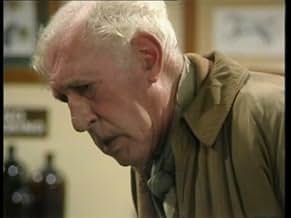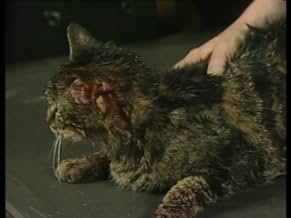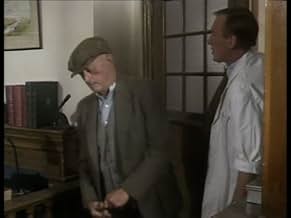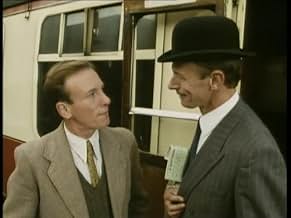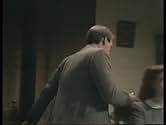Le prove e le disavventure del personale di un ambulatorio veterinario di un paese nello Yorkshire del 1940.Le prove e le disavventure del personale di un ambulatorio veterinario di un paese nello Yorkshire del 1940.Le prove e le disavventure del personale di un ambulatorio veterinario di un paese nello Yorkshire del 1940.
- Candidato a 1 Primetime Emmy
- 1 vittoria e 3 candidature totali
Sfoglia gli episodi
Recensioni in evidenza
10gooelf50
Such a fine series comes along only once or twice in a viewer's lifetime. The actors are second to none. Robert Hardy plays Siegfried Farnon in a wonderfully realistic manner. Here's a man who ranges from a soft natured rural country vetrinarian who cares passionately for every animal he treats, to a raving tyrant who rules his younger brother Tristan with an iron fist. His performances show acting ability that we seldom see in North American productions.
Christopher Timothy routinely delivers up fine performances as James Harriot, the younger partner in the vetrinary practice. Most of the episodes deal with his experiences and he manages to take somewhat mundane situations and make them exciting for the viewers. Over the life of the series we witness his evolution from an inexperienced young vetrinarian to a competent and practiced professional. Along the way we see him become a partner in the practice and woo and win Helen who eventually becomes his wife and the mother of his children.
Comic relief is always forthcoming from Tristan, played to perfection by Peter Davison. It's often hard to accept that he is Siegfreid's brother as the two men are absolute opposites; Siegfried being a serious, studious gentlemen with all the hallmarks of a finely bred British gentleman while Tristan is a boozing, carousing womanizer. The chemistry amongst these three actors makes the series one of the finest ever televised. The production itself is without equal. Scenes are shot on location with the actors participating directly in the action. It's not unusual to see Siegfried or James shoving their hands inside of a living beast to perform some medical process, or wallowing through a muddy barnyard.
A fine and highly realistic series on mid century vetrinarians; certainly the best I've ever seen.
Christopher Timothy routinely delivers up fine performances as James Harriot, the younger partner in the vetrinary practice. Most of the episodes deal with his experiences and he manages to take somewhat mundane situations and make them exciting for the viewers. Over the life of the series we witness his evolution from an inexperienced young vetrinarian to a competent and practiced professional. Along the way we see him become a partner in the practice and woo and win Helen who eventually becomes his wife and the mother of his children.
Comic relief is always forthcoming from Tristan, played to perfection by Peter Davison. It's often hard to accept that he is Siegfreid's brother as the two men are absolute opposites; Siegfried being a serious, studious gentlemen with all the hallmarks of a finely bred British gentleman while Tristan is a boozing, carousing womanizer. The chemistry amongst these three actors makes the series one of the finest ever televised. The production itself is without equal. Scenes are shot on location with the actors participating directly in the action. It's not unusual to see Siegfried or James shoving their hands inside of a living beast to perform some medical process, or wallowing through a muddy barnyard.
A fine and highly realistic series on mid century vetrinarians; certainly the best I've ever seen.
All Creatures Great and Small, is one of those rare, timeless and charming BBC Productions that never seems to age and which can still be enjoyed all these years after its production finished. I think the key for this is the belief that the producers, writers and directors installed into the series to make it real. The charm comes from the fact that it is set a long time ago, in a more gentle and picturesque time when life was easy as could be imagined, before the ravages of World War II left its scars upon the nation. This is a brighter, happier time.The Vetenary work place is of no particular interest to me, but I think that because of the setting of the 1930's it makes everything seem all the more like a fantasy. The other major reason for its success is that it has an absolute solid gold cast in the trio of principles leads. Christopher Timothy as lead Vet James Herriot is basically a good person who loves his job, but who is kind and tries his best with people to be of good nature. He is excellently portrayed by the under-rated Timothy. Second to the success of the series is Robert Hardy as Sigfried Farnon. Hardy is one of the finest television presences, and as the senior Farnon delivers his lines with alot of believable conviction and commands the screen, his character is of the old guard, an even older time when people were strict and strong. You never once doubt that Hardy is a Vet. Completing the trio is the ever suffering Tristan Farnon, perhaps the series most beloved character. Tristan provides the light relief for the series, and is constantly on the bitter end of Sigfrieds wrath. Again the character is excellently played by The Fifth Doctor Who Peter Davison, who exudes public school boyish charms here.He dithers and bumbles his way throughout the series, while at the core being an essential and perhaps strong character, he means well but never quite gets it. Davison is one of Britains finest character actors, again under-rated but looking now as if he will hit the big time after the success of At Home With the Braithwaites. All Creatures Great and Small also has the benefit of some of the finest writers and directors having worked on the show, such as Terence Dudley and Peter Moffet, as well as the multi talanted and consistant head writer Johnny Byrne. It is beautiful to look at from its period setting to the Yorkshire scenery. Defenitley on of the BBC's finest series, and one that shouldn't be overlooked. A fantastic production.
The life and times of Yorkshire Dales veterinary practise in the years leading up to WWII. Based on the million selling James Herriot autobiographies.
James Herriot (real name Alfred White) came to Yorkshire as a young vet looking for his first job and despite being of Scottish origins made the place his own. They have even turned his old surgery (in Thirsk) in to a museum and it well worth a visit. Look it up on the internet if you are visiting the area.
There are very few books well enough written that within a few pages you are dragged inside and falling in love with the characters. I was around when they still were being written and when a new one came out you could be sure I'd be first in line at the bookshop. I'd even set the alarm clock an hour early so I could find more time for them.
(I doubt I'll ever be as excited as that over a book again!)
The fact that the main man carried on long after becoming a millionaire author showed that he was a man of dedication and integrity. Today there is a shortage of farm vets in that part of the world. The life is no easier now than it was then.
The series got together a dream cast and the male leads are fabulous and very true to the pages of the book - while the women try and make the best of their tea making, love-interest and showing-people-in roles.
Many of the pets on the show were treated for free in exchange for them being used on the show. It doesn't get any more "method" than having your hand up the backside of a cow for real! In one episode a foreign female vet seems poised to get involved in the practise -- but she only seems to upset the happy home and soon leaves. Also to be noted is that pages of the book involved bad people and youngsters who turned to crime. Even a suicide. You won't find them here. Nevertheless some of the farmers are less than pleasant people -- with the vets prepared to take them on as clients despite their character and (in real life) propensity for not paying their bills.
The central problem with this series is that sometimes you feel you are born in the wrong age. Oh for the time when country cottages were within the budget of a working man and everyone had time to stop and chat over tea.
Yes, it is a bit misty eyed and cute (although not all the animals are), but there are plenty of morals and lessons-in-life too.
James Herriot (real name Alfred White) came to Yorkshire as a young vet looking for his first job and despite being of Scottish origins made the place his own. They have even turned his old surgery (in Thirsk) in to a museum and it well worth a visit. Look it up on the internet if you are visiting the area.
There are very few books well enough written that within a few pages you are dragged inside and falling in love with the characters. I was around when they still were being written and when a new one came out you could be sure I'd be first in line at the bookshop. I'd even set the alarm clock an hour early so I could find more time for them.
(I doubt I'll ever be as excited as that over a book again!)
The fact that the main man carried on long after becoming a millionaire author showed that he was a man of dedication and integrity. Today there is a shortage of farm vets in that part of the world. The life is no easier now than it was then.
The series got together a dream cast and the male leads are fabulous and very true to the pages of the book - while the women try and make the best of their tea making, love-interest and showing-people-in roles.
Many of the pets on the show were treated for free in exchange for them being used on the show. It doesn't get any more "method" than having your hand up the backside of a cow for real! In one episode a foreign female vet seems poised to get involved in the practise -- but she only seems to upset the happy home and soon leaves. Also to be noted is that pages of the book involved bad people and youngsters who turned to crime. Even a suicide. You won't find them here. Nevertheless some of the farmers are less than pleasant people -- with the vets prepared to take them on as clients despite their character and (in real life) propensity for not paying their bills.
The central problem with this series is that sometimes you feel you are born in the wrong age. Oh for the time when country cottages were within the budget of a working man and everyone had time to stop and chat over tea.
Yes, it is a bit misty eyed and cute (although not all the animals are), but there are plenty of morals and lessons-in-life too.
I'll make it unanimous (so far). When All Creatures first aired in the States, I had already enjoyed the books immensely and doubted that a television production could do author James Herriot's work justice.(A pen name, I believe his real name is Alfred White.) I was delighted to be wrong in that assumption, brilliantly adapted and endearingly performed. It quickly became and remains to this day one of my favorite programs. I particularly recommend the earlier seasons for a number of reasons, not the least of which is Carol Drinkwater as Helen Herriot. I only wish that like Holly the computer on Red Dwarf, who had Lister wipe his memory banks of the collected works of Agatha Christie so that he would have something interesting to read. That I could experience All Creatures Great and Small again, for the first time.
My first introduction to James Herriot was my father's laughing fits while reading the books. Then, the series appeared on PBS and I enjoyed what I saw, which in turn motivated me to read the books. The books are wonderful, almost in the realm of Fantasy (perhaps, the books are my second favorite set of books next to Lord of the Rings) if it weren't so grounded in reality. Sure Herriot smooths some of the rough edges off of his real life, but it still seems real. And this series captures the same feel that the books had, which no small achievement in my opinion. Most of the characters, major and minor, ring true to the depictions in the books and I have little trouble using the images when I re-read the books. Both the books and the series explore triumphs and failures that make life what it is. It makes common sense statements about life without being heavy handed about it. You almost feel you've lived the important, meaningful episodes of someone else's life as if they were your own. What more could be asked from auto-biographical (or semi-auto-biographical) material?
Lo sapevi?
- QuizAlf Wight (the real James Herriot) initially stipulated that all the incidents in the TV series had to be closely based on those in his books. By the end of Season 3, all of Wight's books had been televised, and it was thought that the series would have to end. However producer Bill Sellars persuaded Wight to let the scriptwriters devise new stories as long as the scripts were approved by him and remained faithful to the spirit of his books.
- Citazioni
Mrs. Pumphrey: [orders Hodgekin to throw rings for her Pekinese, Tricki Woo. He throws one feebly] Oh, a little further than *that*, Hodgekin!
Mrs. Pumphrey: [he throws it miles] Not into the rose bed, Hodgekin! We wouldn't want Tricki to get pricky-paw!
Hodgekin: [muttered] Who wouldn't?
Mrs. Pumphrey: *What* was that? What was that, Hodgekin?
- ConnessioniFeatured in Comic Relief: The Invasion of the Comic Tomatoes (1993)
I più visti
Accedi per valutare e creare un elenco di titoli salvati per ottenere consigli personalizzati
Dettagli
- Data di uscita
- Paese di origine
- Lingua
- Celebre anche come
- All Creatures Great & Small
- Luoghi delle riprese
- Langthwaite, Richmond, North Yorkshire, Inghilterra, Regno Unito(hump-backed bridge which James and Siegfried drive over in opening titles of first two series)
- Aziende produttrici
- Vedi altri crediti dell’azienda su IMDbPro
Contribuisci a questa pagina
Suggerisci una modifica o aggiungi i contenuti mancanti

Divario superiore
By what name was Creature grandi e piccole (1978) officially released in India in Hindi?
Rispondi

